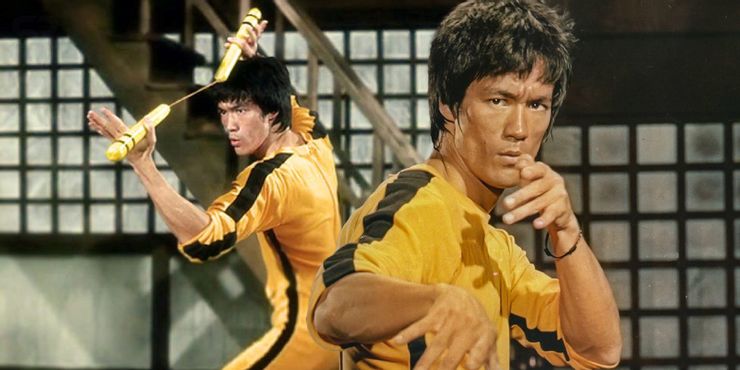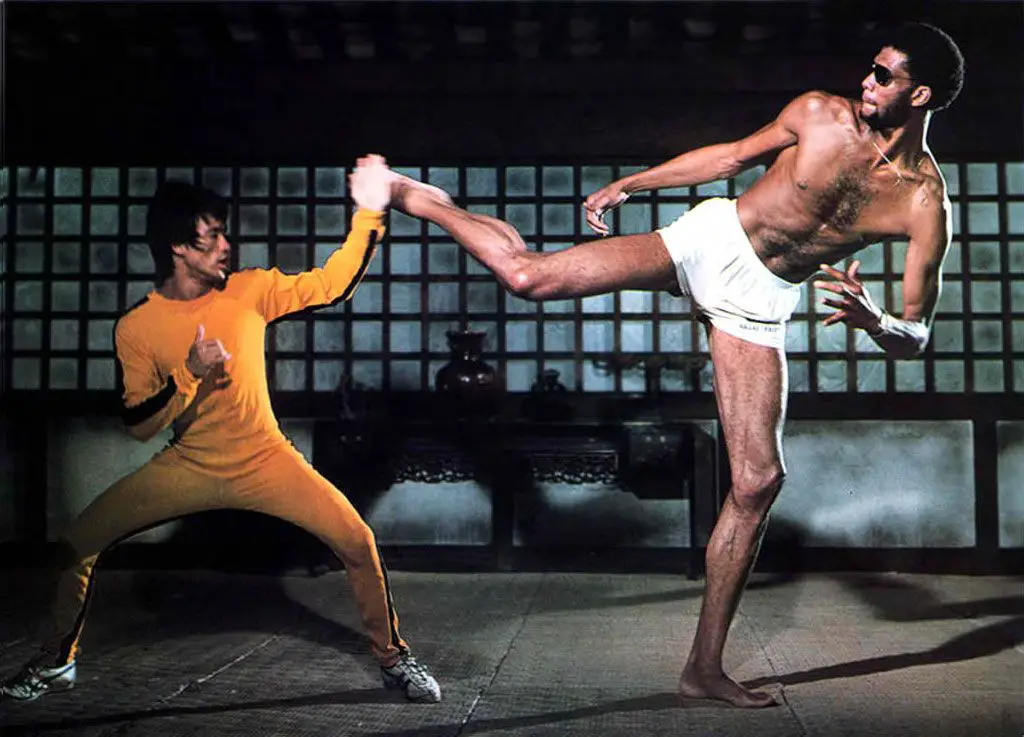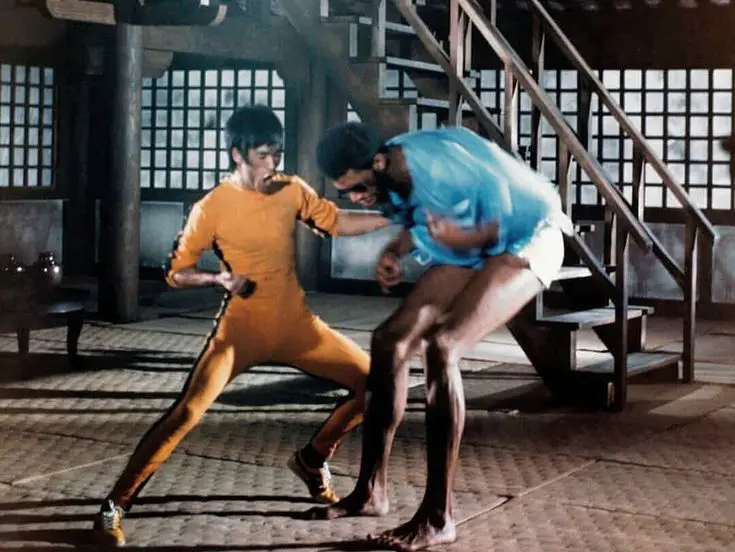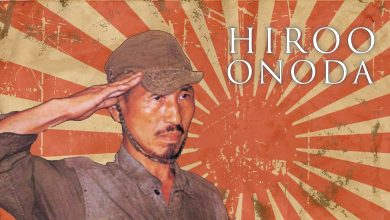
Bruce Lee’s legacy in martial arts cinema remains unparalleled, and his ambitious project, “Game of Death,” captivated audiences and industry insiders alike. This article dives into the fascinating story behind the film and the unfortunate turn of events that unfolded, leaving it abandoned for years. From the casting considerations involving George Lazenby to Bruce Lee’s tragic death, the journey of “Game of Death” showcases the immense talent and vision of one of cinema’s greatest legends.
Key Takeaways
- Bruce Lee’s “Game of Death” was a visionary project that aimed to showcase his martial arts skills and explore philosophical themes.
- George Lazenby, known for his role as James Bond, was considered for a role in the film, adding a Western presence to the project.
- Bruce Lee’s untimely death halted the production of “Game of Death” and left the project in limbo for several years.
- The 1978 version of “Game of Death” utilized the existing footage and introduced a new script to pay homage to Bruce Lee’s original vision.
Bruce Lee’s Ambitious Project: “Game of Death”
Bruce Lee, renowned for his martial arts skills and charismatic presence, had a vision for “Game of Death.” He intended to refine the script further and cast a prominent Western actor for the film. Among the contenders was George Lazenby, an Australian actor who had gained recognition for his portrayal of James Bond in “On Her Majesty’s Secret Service” (1969). Lazenby, having witnessed Lee’s remarkable performance in “The Fist of Fury,” expressed his interest in collaborating with the martial arts icon.

Bruce Lee’s Dinner Plans and Tragic Demise
For Bruce Lee and Raymond Chow, the opportunity to have a well-known actor like George Lazenby in “Game of Death” was promising. However, fate intervened tragically on the night of July 20, 1973. Bruce Lee, anticipating a crucial dinner meeting with Lazenby and Raymond Chow to discuss his involvement in the film, met an untimely demise. This shocking event not only shook the film industry but also halted the progress of “Game of Death.”

The Untimely End of “Game of Death”
With Bruce Lee’s passing, the “Game of Death” project came to an abrupt halt. However, the scenes that Lee had already filmed were not left forgotten. In 1978, a new version of “Game of Death” was released, incorporating the existing footage but with a completely fresh script. This resurrection of Lee’s original vision allowed fans to catch a glimpse of his unmatched martial arts prowess and enjoy a film that paid tribute to his indelible legacy.

FAQ: Answering Your Questions about Bruce Lee’s “Game of Death”
1. What was the concept behind “Game of Death”?
“Game of Death” was a visionary project conceived by Bruce Lee. It aimed to explore the themes of life, death, and martial arts philosophy. The film would have showcased Lee’s unparalleled skills as a martial artist and actor, while delving into the philosophical aspects of combat and the human condition. Lee wanted to create a unique cinematic experience that would both entertain and enlighten audiences.
2. Who was George Lazenby, and why was he considered for “Game of Death”?
George Lazenby was an Australian actor who gained recognition for portraying James Bond in “On Her Majesty’s Secret Service” (1969). Lazenby’s inclusion in “Game of Death” was under consideration as Bruce Lee and Raymond Chow sought to add a prominent Western actor to the film. Lazenby had expressed interest in working with Bruce Lee after witnessing his remarkable performance in “The Fist of Fury.” His involvement would have brought an international appeal to the project and showcased the collaboration between two iconic figures.
3. What happened during Bruce Lee’s scheduled dinner with George Lazenby and Raymond Chow?
Unfortunately, the scheduled dinner meeting between Bruce Lee, George Lazenby, and Raymond Chow on the night of July 20, 1973, never took place. Tragically, Bruce Lee passed away before the meeting could occur, leaving fans and the film industry in shock and disbelief. The exact circumstances surrounding Lee’s death remain a subject of speculation and controversy, but it undoubtedly marked the untimely end of his extraordinary career and dashed the hopes for the realization of “Game of Death.”
4. How did Bruce Lee’s death affect the “Game of Death” project?
Bruce Lee’s sudden demise had a profound impact on the “Game of Death” project. With Lee’s passing, the film’s production came to an immediate halt. The loss of Lee, an exceptional martial artist and actor, created an insurmountable void that could not easily be filled. The project remained abandoned for several years, leaving fans and industry insiders wondering about the fate of Lee’s final cinematic vision.
5. Did the “Game of Death” project ever get completed?
While the original “Game of Death” project was never fully completed due to Bruce Lee’s untimely death, the scenes he had already filmed were not entirely discarded. In 1978, a new version of “Game of Death” was released, utilizing the existing footage and incorporating it into a brand new script. This film allowed audiences to catch a glimpse of Bruce Lee’s unmatched talent and martial arts prowess, paying homage to his legacy and fulfilling, to some extent, the vision he had for “Game of Death.”
6. How did Bruce Lee’s legacy impact the martial arts film genre?
Bruce Lee’s impact on the martial arts film genre cannot be overstated. He revolutionized the genre by introducing a new level of authenticity, intensity, and artistry in his action sequences. Lee’s philosophy of martial arts as a means of self-expression and self-improvement resonated deeply with audiences worldwide. His films not only entertained but also inspired countless individuals to explore the martial arts and embrace a holistic approach to physical and mental well-being.
7. What were the main themes explored in Bruce Lee’s films?
Bruce Lee’s films explored various themes, often intertwining martial arts philosophy with social commentary. Common themes included the quest for personal growth and self-discovery, the struggle against oppression and injustice, and the importance of discipline, focus, and self-control. Lee’s movies also emphasized the transcendence of cultural barriers and the unity of humanity through the universal language of martial arts.
8. How did “Game of Death” contribute to Bruce Lee’s legacy?
“Game of Death,” although unfinished in its original form, remains a significant part of Bruce Lee’s legacy. It represents the ambition, creativity, and dedication that defined his career. Despite the obstacles encountered during its production, “Game of Death” serves as a testament to Lee’s unwavering pursuit of excellence and his desire to push the boundaries of martial arts cinema. Even in its altered 1978 version, the film allows audiences to witness Lee’s unparalleled skills and pay tribute to his enduring influence on the genre.
9. What impact did Bruce Lee’s death have on the film industry?
Bruce Lee’s tragic death had a profound impact on the film industry, both in Hollywood and internationally. His passing not only left a void in the martial arts film genre but also marked the loss of an iconic figure who had the potential to reshape the industry as a whole. Lee’s untimely demise served as a stark reminder of the fragility of life and left millions of fans mourning the loss of an extraordinary talent gone too soon.
10. How does “Game of Death” continue to resonate with audiences today?
Despite its unconventional production history, “Game of Death” continues to resonate with audiences today. The film captures Bruce Lee’s essence and showcases his unparalleled martial arts skills. It serves as a testament to his enduring legacy and remains a testament to his vision and creativity. “Game of Death” reminds us of the indelible mark Bruce Lee left on the world of cinema, inspiring generations of martial arts enthusiasts and film lovers alike.
Conclusion
While “Game of Death” never reached its intended completion, the impact of Bruce Lee’s vision and his remarkable talent cannot be overstated. His untimely death marked a tremendous loss for the film industry, leaving fans and collaborators devastated. However, through the release of the 1978 version of “Game of Death,” audiences were able to catch a glimpse of Bruce Lee’s unmatched martial arts prowess and pay tribute to his indelible legacy. The story of “Game of Death” stands as a testament to Bruce Lee’s enduring influence on martial arts cinema and his status as an icon who continues to inspire generations of fans worldwide.
Game of Death IMDB










One Comment